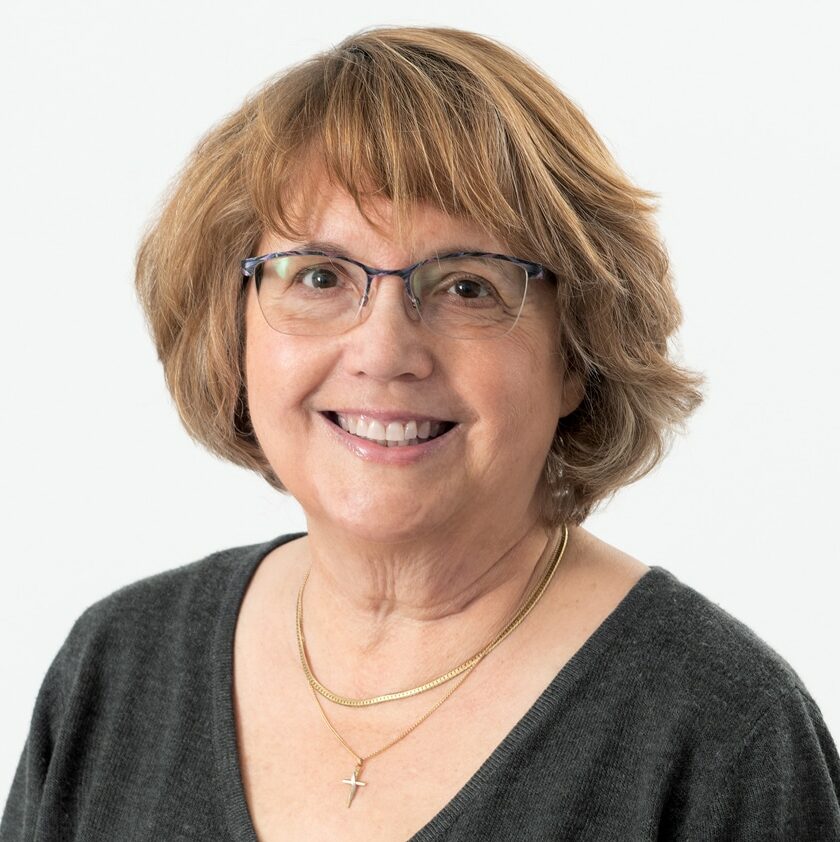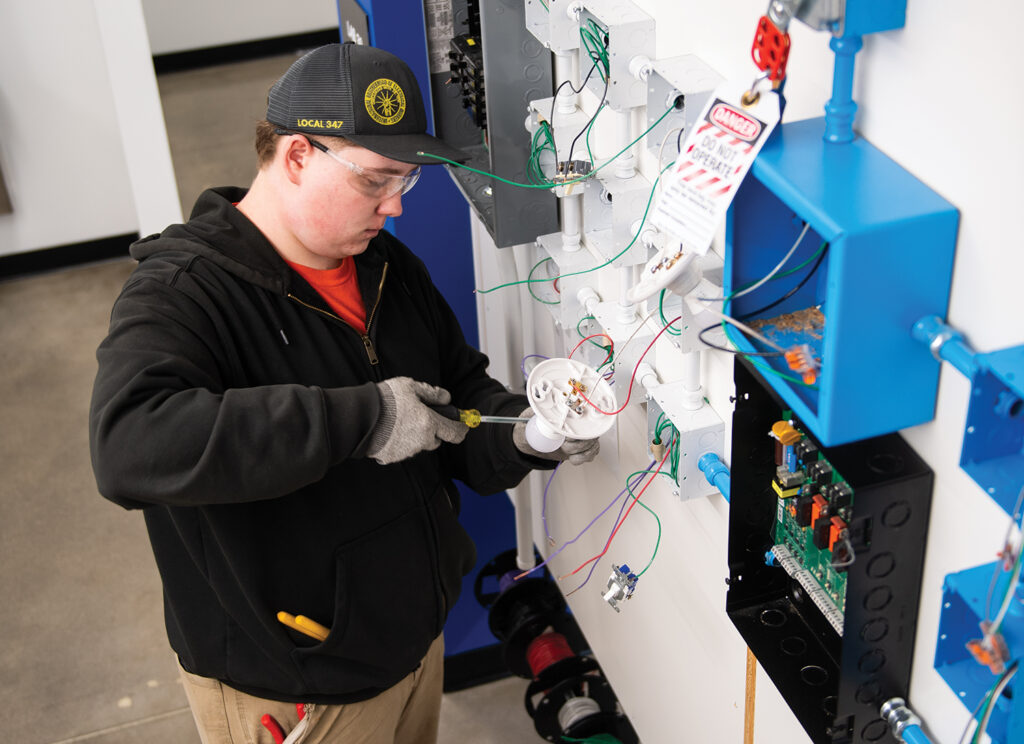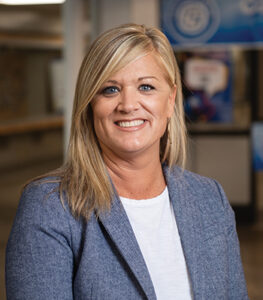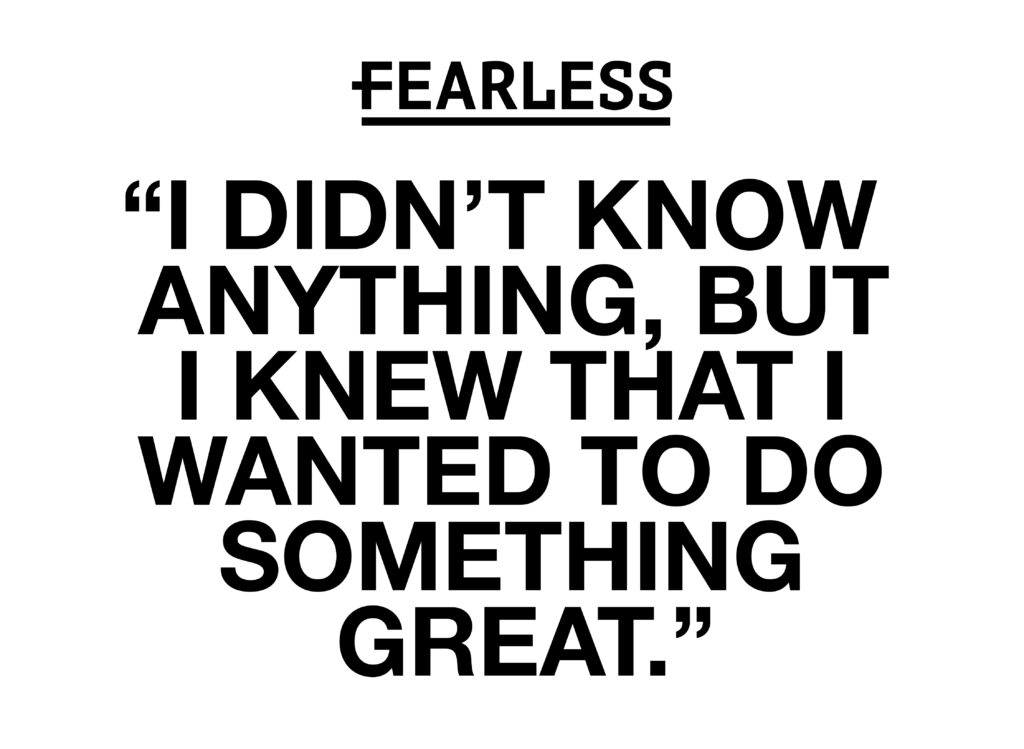Avenue Scholars bridges gap between school and work

Kathy A. Bolten Feb 14, 2025 | 6:00 am
9 min read time
2,243 wordsBusiness Record Insider, Workforce DevelopmentBefore Danny Lindaman could begin his apprenticeship as an electrician, he needed about $400 worth of tools and gear used in the trade: insulated gloves, noncontact voltage tester, screwdrivers, multimeter and wire strippers.
The 2024 Roosevelt High School graduate could have figured out a way to pay for the gear, but he didn’t need to. The tab was picked up by Avenue Scholars, a nonprofit education and workforce development program.
“That made the adjustment to working full time easier,” said Lindaman, 18. “It was something I didn’t have to worry about.”

Lindaman is among 225 Des Moines high school students and graduates currently participating in Avenue Scholars, a program that bridges the gap between education and the workforce by providing students individualized support and counseling, connections to jobs in high-demand fields, and financial support for post-secondary training and schooling.
Instead of graduating from high school and heading into low-wage jobs with limited growth potential, Avenue Scholars participants are equipped with skills and habits needed to be successful in the workplace and exposed to careers with opportunities for advancement. Most importantly, Avenue Scholars provides students with several layers of support as they transition from high school to the workplace or post-secondary training and education.

“We stay with them for five years,” said Noelle Nelson, executive director of Avenue Scholars Des Moines. “It’s what makes us unique.”
Students often don’t complete post-secondary training or education because of finances or don’t have a support system to encourage them to keep moving forward, Nelson said. Avenue Scholars pays for students’ tuition, books and other fees and stays in contact with students as they complete their schooling or training and move into their first full-time job.
“I think that the most important part [of Avenue Scholars] is the relationship that we build with the kids and the wraparound support we provide,” Nelson said. “We will stay with them until they get their first full-time job and up to six months after that.
“It’s our secret sauce.”
Avenue Scholars’ beginnings
Avenue Scholars was founded in 2008 in Omaha by Ken Bird, a former Nebraska school superintendent. Bird wanted to develop a program that provided young people financial aid in pursuing training or education after high school as well as career development and educational support.
Avenue Scholars “actually started as a scholarship program,” Nelson said. “They wanted to get as many kids into scholarships and accessing four-year colleges as possible. The success rate was not very high. Kids were not adequately prepared for the demands of post-secondary education and didn’t have a good support system. … It just wasn’t about money.”
Over time, the program evolved to focus on providing students the skills and support they needed to pursue training, certifications or two-year degrees for careers in high-demand industries, Nelson said. “Success went way up.”
The program begins in high school and is focused on students with middling grades and financial need who want to pursue some form of post-secondary education or training.
Students, called scholars in the program, are part of Avenue Scholars for five years, which includes after high school graduation. In high school, scholars in their junior and senior years attend classes that help them develop resumes, hone job interview skills, learn good workplace habits and improve their financial literacy. They also are exposed to career opportunities in the areas of business, health sciences, information technology, skilled trades and manufacturing, and automotive and transportation.
The program, thanks to a five-year grant from the MidAmerican Energy Foundation, expanded into the Des Moines school district in 2022. Avenue Scholars was offered at Roosevelt and East high schools its first two years in the district. It is now in all five Des Moines high schools and serves 125 juniors and seniors.
Each high school has a full-time career coach who sees students daily in class.
The program’s curriculum is designed to equip students for the workplace, Nelson said. Students learn “professional skills, resume building, interview skills, conflict management, a lot of soft skills that business leaders are asking for that kids don’t always come prepared with.”
During the school year and summer months, scholars can work in paid internships or pre-apprenticeship programs at businesses that have partnered with Avenue Scholars.
“We’ll provide the support system to make sure [scholars] are showing up and they’re successful but we can’t duplicate the work experience,” Nelson said. About half of Avenue Scholars participants will have some type of industry-aligned work experience before they leave high school, she said.
After graduating from high school, students can enter the workforce or apprenticeship program or attend Des Moines Area Community College, Drake University’s Bright College or Mercy College of Health Sciences.
Any tuition or fees not covered by grants or scholarships are paid for by Avenue Scholars, which has a $1.5 million annual budget.
“All of the kids in our program are impacted by poverty to some degree,” Nelson said. “Through our program and through higher ed’s contribution, they’ll get to go [to a two-year program] with no out-of-pocket cost. That’s the financial leg up they get by being part of our program.”
Avenue Scholars spends about $5,000 per student on tuition assistance and other financial help, Nelson estimated.
By the numbers
The following is from Avenue Scholars Des Moines 2023-24 annual report:
125
Number of high school students participating in the program
100
Number of high school graduates participating in the program
30
Number of students who received paid internships or pre-apprenticeships
98%
Percentage of students who graduated on time
89%
Percentage of students who pursued post-secondary education or obtained industry-aligned job
76%
Percentage of students who received a 2.5 grade-point average or higher in school year
89%
Percentage of students who pursued post-secondary education or obtained industry-aligned job
Preparing for a career
Briana Roman, a Roosevelt senior, wants to pursue a career in health care but, until joining Avenue Scholars, was unsure of how to achieve the goal. An instructor at Roosevelt connected Roman to the Avenue Scholars program during her sophomore year. The following year, Roman took classes focused on workforce readiness. The classes also exposed Roman to various careers in health care, she said.
Through Avenue Scholars, Roman was able to obtain training to become a certified nursing assistant, which led to a job at Wesley on Grand Senior Living Community helping residents with daily tasks and other needs.
Avenue Scholars “taught me a lot about time management, money management, how to prepare for interviews … a lot of things that I wouldn’t have gotten from other high school classes,” said Roman, 17.
“This job has really shown me how to work in a team,” said Roman, who plans on becoming a registered nurse.
Roman works three to four shifts a week, mostly after school and on weekends. She is enrolled in a course where she is learning medical terms in English and Spanish. “This will help me translate things for any [Spanish speakers] who come into the workplace,” she said.
Avenue Scholars has provided WesleyLife with five CNAs, said Jessica Hays, a talent acquisition specialist for the nonprofit group that offers several levels of senior living care and other resources for older adults.
Students in the program shadow WesleyLife employees to learn about the different job opportunities at the centers, Hays said.
Filling open positions in health care, especially for nurses and CNAs is difficult, Hays said. Filling the positions in a senior care facility can be even harder, she said.
“There can be a stigma around working in a nursing home … but once we get [students] on-site for tours or job shadows, the attitude changes,” Hays said. “They see all of the amazing amenities we have like our fitness centers and restaurants and bistros. They see that our residents are not just aging in place, they are living full, robust, happy lives and [the scholars] want to be a part of it.”
Avenue Scholars has excelled at preparing students for careers in health care, Hays said. “The students come equipped with both the technical skills and compassionate mindset that our leadership teams are looking for in our team members.”
Attracting skilled workers
A career emphasis for Avenue Scholars is preparing students to work in one of the skilled trades such as carpentry, plumbing, welding, masonry and electrical work.
Nationwide, and in Iowa, the number of people retiring from jobs in skilled trades exceeds the number entering the workforce, including those in the electrical trade.
“We don’t need people to come equipped and trained,” said John Irving, president of Tri-City Electric Co.’s Central Iowa Division. “But finding people who want to enter a skilled trades occupation is the hard part. It’s not a glamorous job. You start at the bottom and work your way up.
“But once you get your license there are many options: You can travel anywhere. You can move around the country. You can get a promotion, become a superintendent or a project manager. You can start your own business,” he said.
“I like the way Avenue Scholars doesn’t just place somebody [in a job] and then forget about them,” Irving said. “They work with them well into their career. … It’s more like a mentorship program. A lot of kids don’t have anybody in their lives to encourage them to do something or help them when they encounter obstacles.”
Lindaman, a Tri-City Electric employee, is assigned to work at one of the data centers that Microsoft Corp. is building in West Des Moines. He also is being trained through the Des Moines Electrical Apprenticeship program in Urbandale.
The first week on the job, Lindaman’s foreman told him to expect to work up to 58 hours a week.
“I was worried about whether I could work all of those hours and do my homework for the apprenticeship,” Lindaman said. An Avenue Scholars career coach and an instructor with the apprenticeship program suggested Lindaman talk to the foreman and explain his situation.
“They gave me good advice,” Lindaman said. “I was new to working full time but I also didn’t want to get burned out and not do well in class.”
The next five years
In the next five years, Nelson expects the program to be at full capacity, with a staff of 12 serving 400 students.
Nelson would like to see the Des Moines-area business community recognize Avenue Scholars as a program that provides quality candidates for jobs in the workplace. “If you’re a [human resources] professional and you see an Avenue Scholars applicant in your pool, you will know that almost guarantees a quality candidate,” she said. “My vision would be that we are well established enough that it gives our students a competitive edge.”
Nelson would also like to expand Avenue Scholars’ partnerships with the business community. Currently several businesses, including MidAmerican Energy, Principal Financial Group, the Wittern Group, Willis Automotive and others provide scholars with apprenticeships and internships and provide employees to do mock job interviews and workplace tours.
In addition to getting more businesses involved in the program, Nelson said she would like to establish a sponsorship program in which a business donates $5,000 that would pay for the cost of training for a scholar. In return for the donation, the business would have the first choice of the program’s talent pipeline.
“The by-product of that is our kids improve their lives, help their families and stay in our community,” Nelson said.
Avenue Scholars receives 5-year grant
The Thomas and Linda Koehn Foundation has awarded Avenue Scholars a five-year grant that will be used to help expand and enhance the path into skilled trades for interested Des Moines high school students.
The Skilled Trades Pathway is designed to help students successfully transition from high school to apprenticeship programs, technical training, or full-time employment in skilled trades.
“Through an increased emphasis on the trades, we can equip students with the skills and confidence needed to secure stable, high-paying careers that contribute to our local economy,” Noelle Nelson, Avenue Scholars’ executive director, said in a prepared statement.
The grant will help boost enrollment in the school district’s skilled trades programs, which will lead to higher placement rates in apprenticeship programs and full-time skilled trades jobs.
The foundation asked that the amount of the grant not be released, Nelson said. A news release described the amount as “significant.”
Lack of transportation limits work experiences
Before Avenue Scholars participants can take advantage of internships offered by local businesses, they need to have reliable transportation, said Noelle Nelson, the program’s executive director.
About half don’t have access to a vehicle, she said.
“We try to secure a transportation plan with every single kid, but sometimes it is limited,” Nelson said. The lack of transportation “adds a whole other layer of complexity when we’re trying to get [work] experiences for these kids. Without a job, they can’t buy a car and without a car, they can’t get to the job.”
One solution has been to use Ubers, Nelson said.
Also, Avenue Scholars has begun a pilot matching fund program for students in the skilled trades, she said. If a student can save $2,500 to buy a vehicle, the program will match the money. Five students are part of the pilot, Nelson said. “That will give them $5,000 to purchase a car,” she said.

Kathy A. Bolten
Kathy A. Bolten is a senior staff writer at Business Record. She covers real estate and development, workforce development, education, banking and finance, and housing.









